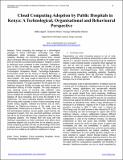Cloud Computing Adoption by Public Hospitals in Kenya A Technological, Organisational and Behavioural Perspective
Publication Date
2020Author
Billy Ogwel, Gabriel Otieno, George Odhiambo
Metadata
Show full item recordAbstract/
Cloud computing has emerged as a technological
paradigm to reduce Information Technology costs, foster
collaboration while increasing productivity, availability,
reliability, flexibility and minimizing response times. Despite
cloud computing offering numerous benefits to the health sector,
there are only few successful implementations. Adoption is slower
in healthcare sector compared to other industries. Furthermore,
there is little concerning the adoption and benefits of cloud
computing in Kenyan healthcare sector. This study integrated the
Technological Acceptance Model, Technology-OrganizationEnvironment model and the Theory of Planned Behaviour to
provide a richer theoretical lens for assessing factors affecting
cloud adoption. This study sought to determine the influence of
technological, organisational and behavioural contexts in cloud
computing adoption. The target population for this study were 114
healthcare personnel (facility in-charges and health records and
information officers) in Public hospitals. The study employed a
cross sectional survey in one-time data collection using
questionnaires from sampled personnel. Logistic regression was
used to establish the correlation between the projected factors and
adoption of cloud computing, and to show the strength of this
relationship. The cloud computing adoption prevalence was at
58% among public hospitals. In terms of cloud computing service
models among adopters, Software-as-a-Service was at 100%,
followed by Platform-as-a-Service at 5% while none had
implemented Infrastructure–as-a-Service. The study found out
that technological readiness, service quality, expert scarcity, top
management support, firm size, perceived usefulness, perceived
ease of use and social influence have a significant effect on cloud
computing adoption. The findings from this study will help
healthcare organisations to better understand what affects cloud
computing adoption and to guide them in the adoption process.
Cloud computing providers can also use the findings of this work
to address areas of concern thereby offering products and services
that have the confidence of healthcare institutions in Kenya

